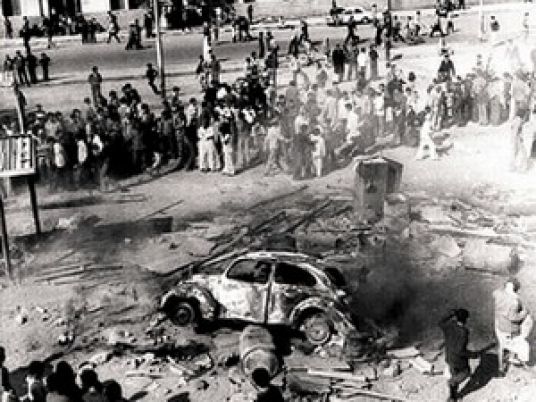
Surrounded by security personnel, as few hundred bread distribution workers protested on Sunday outside the cabinet demanding permanent contracts. They were working in El-Behaira city on distributing subsidized bread to homes, a project which was launched by the government to lighten the crowding bread queues.
Around more than 3,000 workers have been working for more than 15 years in this project. But after announcing the new smart cards system those workers have now joined the ranks of Egypt's unemployed.

“We demand permanent hiring, or to work in the local units. We have been working in that project for between seven and 20 years and now we don’t have a job to make a daily living. We have not got paid for three months,” said worker Yoursi Mohammed.
“At 53 years old, do you think I can apply for a new job?” Mohammed asked.
The workers protest comes in line with the anniversary of bread uprising on 17 January 1977. When Abdel Moneim El-Kaissouni, the deputy prime minister, announced in a parliamentary statement the proposed subsidies cut for a range of essential commodities including bread, sugar, tea, rice, oil and gasoline and an increase in prices of 25 items by 50 percent.

Protesters riot during the Bread Uprising on 17 January 1977.
The decision came in wake of president Anwar al-Sadat’s new economic policy that aimed at taking loans from the World Bank and International Monetary Fund to lighten the amount of foreign debt. Both banks required cutting subsidies on basic foodstuffs.
That year was not the first workers’ revolt as there were two other workers uprising in 1975 and 1976, which began with a number of large labor gatherings in Cairo and Helwan area with workers from the Misr Helwan Company for spinning and weaving along with ordnance factories, textile factory workers in Shubra and arsenal marine company in Alexandria. Workers massed in streets declaring their rejection of the economic decisions and chanted against hunger and poverty. At least 79 people were killed and more than 550 injured in the protests.
It was also not the last workers uprising in Egyptian history, as workers of the Holding Company for Cotton Spinning and Weaving in Mahalla massed in December 2006, September 2007 and 6 April 2008, protesting for their rights.
Moreover, many human rights advocates argue workers were the fuel of the 2011 revolt, as they broke the Egyptians’ fear of protests by their frequent demonstrations.
Tahrir Square fills during protests demanding political change.
After almost fifty years of workers uprisings across the Egyptian history, the question which is strongly presenting itself is “Did the workers achieved their demands?”
After 25 January and 30 June, workers were looking forward to a prosperous future, which has yet to arrive. Speaking to Egypt Independent Nagi Rashad PR secartariat at Workers Federation Union, he said that workers have witnessed four difficult eras during four regimes.
“Despite the police state during the regime of ousted president Hosni Mubarak, at least there were negotiations. For instance, when Mahalla textiles workers protested, the prime minster showed up to negotiate. But after 25 January and 30 June, workers have been going through dark days,” Rashad said.
However, Rashad pointed out the workers have played undeniable role to kick out the regime of Mubarak in his last days before 2011 revolution, but they were neglected all the time, Especially when the Supreme Council of Armed Forces (SCAF) took over role and issued article number 48 in 2011 which imposed a LE500 fine on any protesting worker.
He added that the same ignorance policy continues during the former president Mohammed Morsy.
“Currently the regime scares the workers in favor of praising the businessmen in order to fortify our failing economy,” Rashad said.he continued “Moreover, they are smearing protesters by repeating that they are part of the Muslim Brotherhood, which intimidates workers from demanding their rights, though workers are only asking for their daily bread.”

Workers protesting in Mahalla
Meanwhile, as protests continue as workers ask for a decent living. Just a few days ago, around 10,000 workers at the Holding Company for Cotton Spinning and Weaving in Mahalla began a strike demanding an immediate restructuring of the company’s leadership.
In a separate incident, workers at the General Organization for Government Printing Offices massed, demanding being paid the annual profit share estimated at 32 months’ salaries for 4,000 workers as in last year.
The workers at the Egyptian and Iron Steel Company (EISCO) also went on a total strike demanding 15 months worth of annual profit shares, four delayed bonuses for this year, the dismissal of the board of directors and the return of transferred and dismissed workers from previous strikes.

